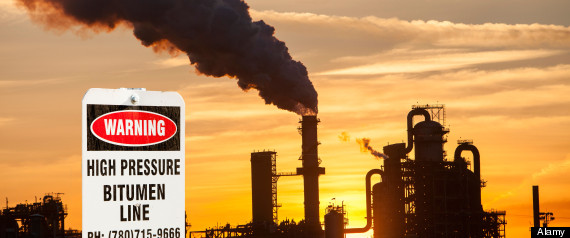Canada's greenhouse gas emissions continue to level off or decline in most sectors - with the exception of the Alberta oilsands.
An annual inventory report submitted by the Harper government to the United Nations last week had federal politicians patting themselves on the back, as they declared themselves the first Canadian government to lower greenhouse gases.
The report, which covers emissions in Canada in 2011, revealed a total of 702 million tonnes, which is 5 per cent below 2005 levels.
"Under the previous Liberal government, greenhouse gas emissions actually increased by a staggering 30 per cent. We were the first government in Canadian history to reduce greenhouse gas emissions." Environment Minister Peter Kent told Postmedia News.
However, things are not so pristine in Alberta.
Alberta's oilsands saw greenhouse gas emissions grow from 15 million tonnes in 2005 to 55 million tonnes in 2011, making the oil sector partly responsible for Canada's top spot as the G8 country with largest emissions growth in last decade.
Alberta's oilsands, the report states, now represents about eight per cent of Canada's overall annual emissions, while the province's industrial facilities combined are responsible for 48 per cent of all industrial emissions in the country in 2011.
Ontario trails behind with 19 per cent of emissions, Saskatchewan at nine per cent and Quebec at eight per cent.
Compiled by Environment Canada, the report pointed out Canada's average temperatures were 1.5 degrees warmer than average, and that emissions contributing to that temperature change were declining or stabilizing after a mix of federal and provincial policies.
"In some regions, the impacts could be devastating, while other regions could benefit from climate change," the report said.
The Alberta government quietly presented a proposal earlier this month to sharply increase levies on carbon production and force oil producers to cut greenhouse gases by as much as 40 per cent per barrel of production.
This follows a 2007 regulation that required producers and large emitters in Alberta to reduce emissions by 12 per cent per barrel and pay $15 for every tonne above their limit into a provincially-run technology fund.
However, the Globe and Mail reports a letter from the Pembina Institute urged governments to impose a levy of at least $100 per tonne for emissions above the targeted level.
Other environmental organizations have called foul on the Redford government recently, claiming Redford's speeches and newspaper ads portray Alberta as a leader in fighting climate change, when the opposite is true.
“It’s difficult to watch your leader go to another country and make a great case for itself but back home everyone is waiting for announcements on these issues,” Sierra Club prairie chapter President Chelsea Flook told Global News.
Oilsands producers have reduced the amount of greenhouse gas emitted by almost 30 per cent per barrel, but overall rates have spiked as production grows.
The statistics and analysis provided to the U.N. were mandatory due to the United Nations Framework Convention on Climate Change.
Original Article
Source: huffingtonpost.ca
Author: The Huffington Post Alberta
An annual inventory report submitted by the Harper government to the United Nations last week had federal politicians patting themselves on the back, as they declared themselves the first Canadian government to lower greenhouse gases.
The report, which covers emissions in Canada in 2011, revealed a total of 702 million tonnes, which is 5 per cent below 2005 levels.
"Under the previous Liberal government, greenhouse gas emissions actually increased by a staggering 30 per cent. We were the first government in Canadian history to reduce greenhouse gas emissions." Environment Minister Peter Kent told Postmedia News.
However, things are not so pristine in Alberta.
Alberta's oilsands saw greenhouse gas emissions grow from 15 million tonnes in 2005 to 55 million tonnes in 2011, making the oil sector partly responsible for Canada's top spot as the G8 country with largest emissions growth in last decade.
Alberta's oilsands, the report states, now represents about eight per cent of Canada's overall annual emissions, while the province's industrial facilities combined are responsible for 48 per cent of all industrial emissions in the country in 2011.
Ontario trails behind with 19 per cent of emissions, Saskatchewan at nine per cent and Quebec at eight per cent.
Compiled by Environment Canada, the report pointed out Canada's average temperatures were 1.5 degrees warmer than average, and that emissions contributing to that temperature change were declining or stabilizing after a mix of federal and provincial policies.
"In some regions, the impacts could be devastating, while other regions could benefit from climate change," the report said.
The Alberta government quietly presented a proposal earlier this month to sharply increase levies on carbon production and force oil producers to cut greenhouse gases by as much as 40 per cent per barrel of production.
This follows a 2007 regulation that required producers and large emitters in Alberta to reduce emissions by 12 per cent per barrel and pay $15 for every tonne above their limit into a provincially-run technology fund.
However, the Globe and Mail reports a letter from the Pembina Institute urged governments to impose a levy of at least $100 per tonne for emissions above the targeted level.
Other environmental organizations have called foul on the Redford government recently, claiming Redford's speeches and newspaper ads portray Alberta as a leader in fighting climate change, when the opposite is true.
“It’s difficult to watch your leader go to another country and make a great case for itself but back home everyone is waiting for announcements on these issues,” Sierra Club prairie chapter President Chelsea Flook told Global News.
Oilsands producers have reduced the amount of greenhouse gas emitted by almost 30 per cent per barrel, but overall rates have spiked as production grows.
The statistics and analysis provided to the U.N. were mandatory due to the United Nations Framework Convention on Climate Change.
Original Article
Source: huffingtonpost.ca
Author: The Huffington Post Alberta

No comments:
Post a Comment